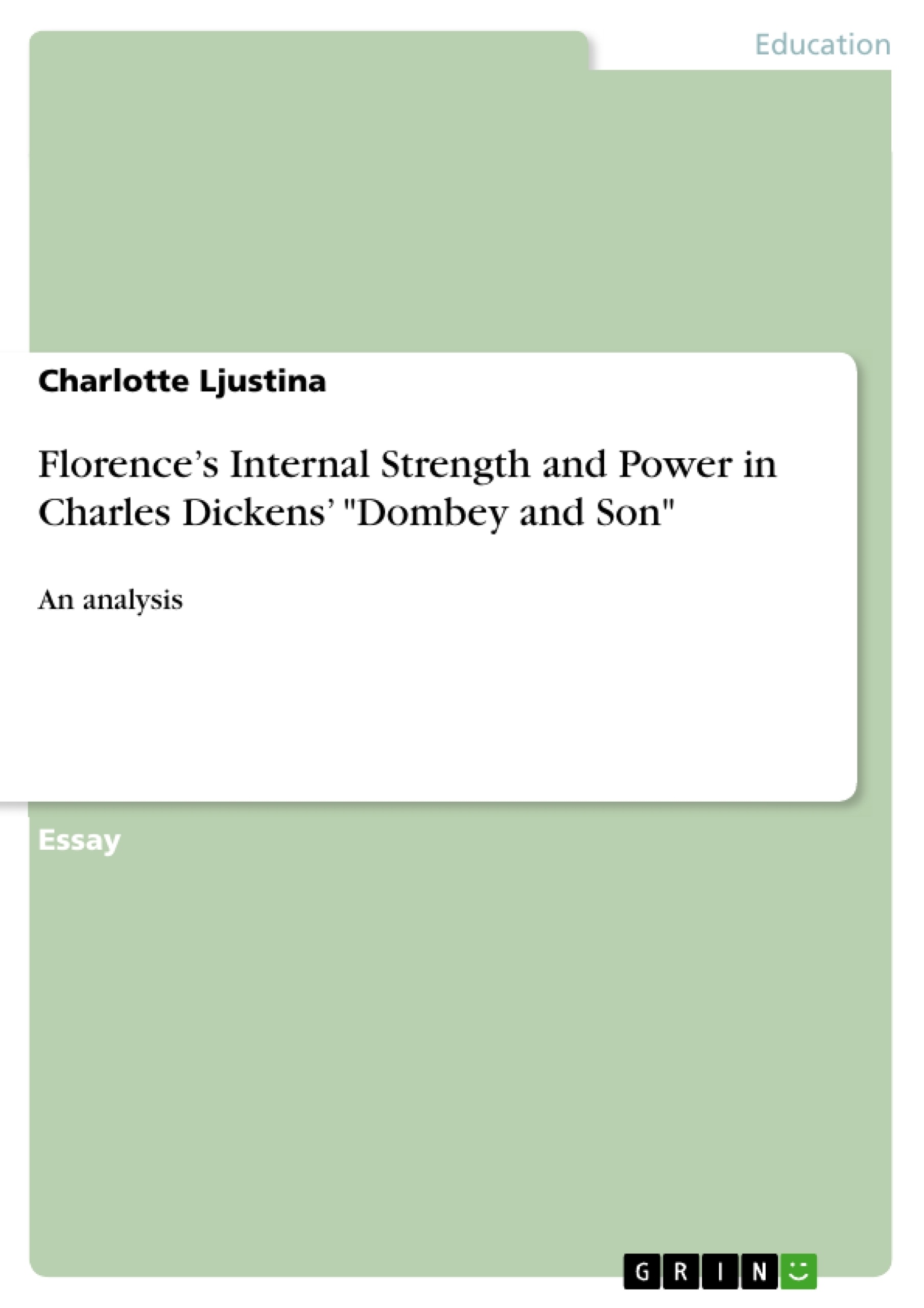The relationship between a father and his daughter is a well explored concept in Charles Dickens' novel "Dombey and Son". Various critics have suggested that the protagonists daughter, Florence, should be interpreted as a meek and feeble damsel in distress, tortured by her father’s inability to love her. Florence’s refusal to stand up to her father and unending quest for his love are represented as weaknesses that deem her a “fairy-tale princess”. Is it possible, then, to reverse the lens and consider Florence an emblem of strength? Or does her father's abuse diminish her capacity as a nineteenth century heroine?
This essay offers a character analysis on the basis of the text.
Table of Contents
- Florence's Internal Strength and Power in Dickens' Dombey and Son
Objectives and Key Themes
This paper aims to re-evaluate the character of Florence Dombey in Charles Dickens' Dombey and Son, challenging conventional interpretations that portray her as a passive, weak figure. The analysis focuses on Florence's strength and internal power, particularly in the context of her abusive relationship with her father.
- Mr. Dombey's hatred for Florence and its roots in his fear of her potential to disrupt his established order.
- Florence's role as a symbol of modernity and change, threatening the patriarchal structures of the Dombey household and business.
- Florence's capacity to influence and challenge Mr. Dombey's power, even amidst his emotional abuse.
- The reinterpretation of Florence's seemingly submissive behavior as a testament to her resilience and inner strength.
- The comparison of Florence's relationship with her father to a "cobra relationship," highlighting the dynamics of power and control within abusive relationships.
Chapter Summaries
Florence's Internal Strength and Power in Dickens' Dombey and Son: This paper argues against the common portrayal of Florence Dombey as a weak, submissive character. It explores the complex dynamics of Florence's relationship with her father, Mr. Dombey, revealing how his hatred stems from his fear of her disruptive potential. Florence's defiance, manifested in her refusal to conform to his expectations, becomes a powerful testament to her inner strength and resistance to his emotional abuse. The analysis draws upon critical perspectives to support the argument that Florence's enduring presence in her father's life is not a sign of weakness but of extraordinary resilience. The paper challenges the notion of Florence as a passive victim, instead portraying her as a modern, empowered woman battling the constraints of a patriarchal society. The use of examples from the text, such as Mr. Dombey’s attempts to erase Florence from his legacy, highlight her implicit challenge to her father's power and the prevailing social norms.
Keywords
Charles Dickens, Dombey and Son, Florence Dombey, abusive relationships, patriarchal society, female empowerment, resilience, internal strength, character analysis, literary criticism, Victorian literature.
Florence's Internal Strength and Power in Dickens' Dombey and Son: FAQ
What is the main objective of this paper?
This paper re-evaluates Florence Dombey's character in Charles Dickens' Dombey and Son, challenging the common perception of her as passive and weak. It focuses on highlighting her inner strength and power, especially within her abusive relationship with her father.
What are the key themes explored in the analysis of Florence Dombey?
The analysis explores Mr. Dombey's hatred for Florence and its roots in his fear of her potential to disrupt his established order. It examines Florence's role as a symbol of modernity and change, threatening patriarchal structures. It also investigates Florence's capacity to influence and challenge her father's power despite his abuse, reinterpreting her seemingly submissive behavior as resilience. Finally, it compares her relationship with her father to a "cobra relationship," illustrating the dynamics of power and control in abusive relationships.
How does the paper challenge traditional interpretations of Florence Dombey?
The paper argues against portraying Florence as a weak, submissive character. It reveals her defiance and refusal to conform to her father's expectations as testaments to her inner strength and resistance to emotional abuse. It challenges the idea of her as a passive victim, instead presenting her as a modern, empowered woman battling patriarchal constraints.
What evidence is used to support the paper's argument?
The paper uses examples from the text, such as Mr. Dombey's attempts to erase Florence from his legacy, to illustrate her implicit challenge to his power and societal norms. It also draws upon critical perspectives to support its argument that Florence's enduring presence in her father's life signifies extraordinary resilience, not weakness.
What are the key takeaways from the chapter summaries?
The chapter summary emphasizes the reinterpretation of Florence Dombey as a strong and resilient character who actively resists her father's emotional abuse and the patriarchal constraints of Victorian society. Her seemingly submissive behavior is presented as a strategic form of survival and defiance, rather than a sign of weakness.
What are the keywords associated with this paper?
The keywords include: Charles Dickens, Dombey and Son, Florence Dombey, abusive relationships, patriarchal society, female empowerment, resilience, internal strength, character analysis, literary criticism, Victorian literature.
What type of academic work is this?
This is a language preview providing a comprehensive overview including the title, table of contents, objectives and key themes, chapter summaries, and keywords. It is intended for academic use and analysis of themes within the literary work.
- Quote paper
- Charlotte Ljustina (Author), 2013, Florence’s Internal Strength and Power in Charles Dickens’ "Dombey and Son", Munich, GRIN Verlag, https://www.grin.com/document/307718



